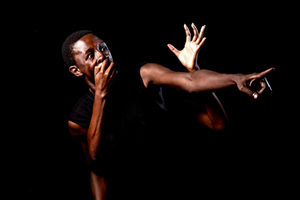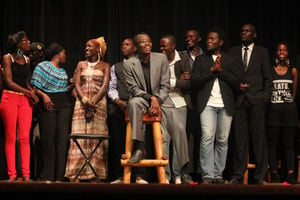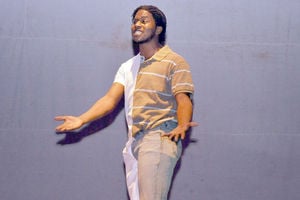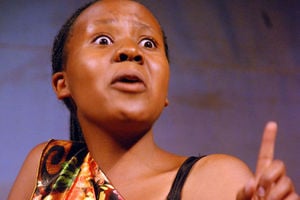
A video grab of Jason Ntaro on stage. Photo/Courtesy of @jasonntaro handle
“They are wolves,” says top-flight Ugandan poet Ngobi Kagayi, when talking about a new crop of poets. “They do not know the power of collectives; most of them do not even read.”
There is a crisis which has rewritten the narrative of what it means to be a poet in Uganda and repurposed it as a sort of word salad that has left the poetry industry reeling. Kagayi was talking about the so-called young poets, as many of them call themselves, who are newly-minted in the field of Ugandan poetry.
It is true that even Homer nods; says a famous aphorism about human fallibility. Indeed, none of the different generations of Ugandan poets is perfect. That is why a clash of orientations among poets should be tractable. But what is happening in the world of poets reflects warring worlds, instead of a unity of purpose.
Poets of old
But how did we reach here? To answer that question, let us return to the giants upon whose shoulders we stand. Okot p’Bitek, a Ugandan poet, novelist, and social anthropologist, is by no means Uganda’s first poet. However, his three verse collections—Song of Lawino (1966), Song of Ocol (1970), and Two Songs (1971)—are of the first magnitude. He has inspired countless poets with his ascendant yet accessible verse.
Then we have Prof Timothy Wangusa. His collection of poems Salutations: Poems 1965-1975 (1977), reissued with additional poems such as A Pattern of Dust: Selected Poems 1965-1990 (1994), reflects an Indigeneity (implicitly) exhorting a generation of poets to be authentically African.
If Prof Susan Kiguli had only written her collection of poems, The African Saga, she would still be in everyone’s top five lists of Uganda’s best poets. In 2004, she published her doctorate "Oral Poetry and Popular Song in South Africa and Uganda: A Study of Contemporary Performance.”
By this, she set herself apart as a poet with the poetic sense to elevate the poetic sensibilities of every Ugandan poet, and poet aficionado.
Beverley Nambozo Nsengiyunva founded the Babishai Niwe (BN) Poetry Foundation (formerly The Beverley Nambozo Poetry Award for Ugandan women) which began in 2008 as a platform for promoting poetry. Her networking skills and liquid charm effectively marketed Ugandan poetry’s rhetorical chops. She didn’t stop there. By making the award continent-wide, she extended the frontiers of creative expression.
A new wave
Raymond Ojakol, Collins Assiimwe, Guy Mambo, Alal B. Sophia, among others, came up with the Lantern Meet of Poets as a community of poets who transformed poetry into a socio-cultural touchstone. To paraphrase the 35th president of the United States, John F Kennedy: I think this [the Lantern Meet] is the most extraordinary collection of talent, of human knowledge that has ever been gathered together at Makerere University, with the possible exception of when VS Naipaul dined at the Guild Canteen alone.
Around this time, another group of poets, not as purist as the Lantern Meet, but every bit as exceptional, was coming up.
“I joined the Open Mic Uganda team in 2012 and that is still one of the most treasured experiences of my life! I met good people, learnt so many lessons and grew in ways that I’d never imagined. Open Mic Uganda is the longest-running spoken word platform that has played a big role in the growth of spoken word, poetry and story-telling in Uganda,” says Maritza, a founder.
In 2015, Kelele at Makerere was founded. Today, it is known as the Kelele Foundation, comprising a group of creatives and creative arts enthusiasts from Uganda working to promote young and upcoming poets and visual artists. It boasted a veritable Hall of Fame roster of soon-to-be outstanding versifiers such as Wake, a very talented performance poet and rapper, whose real name is Gordons Mugooda.
Then there was Ivan “Zombie” Agaba, Ssebo Lule, Nsubuga “Nze” Muhammad, Allan The Poetic Dancer, Devis the Poet, Ian Niiwebyona and Obed Obedgiu, among others. This group of poets was determined to bridge the narrowing chasm of excellence between the likes of Prof Kiguli and a Hawa Kimbugwe or a Laker Patience or a Joanne Marybud.
Prophet Kagayi
According to the Bible, all people shall be given prophets in their own tongue. It is no different for poets. In 2016, that prophet came with the release of The Headline That Morning and Other poems, a poetry collection by Ngobi Kagayi. There are 50 poems in the book, each packing the punch of 100-proof vodka.
Then, all of sudden, a number of young poets came on the scene. These were typified by the sound and fury of exceptional performers such as Heights The Poet, Lus the Poet, Kitara Nation, Bint and others. Poetry outfits such as Totoma, Kwivuga, Utenzi House, Kitara Nation, Stubborn Poetry, Echo Minds Poets, LADU Poetry, to name but seven, sprang into lyrical existence.
In 2018, Ronald Ssekajja's book: Echoes of Tired Men, hit the stalls and a year later, he had formed the Poets’ Association of Uganda (PAU). At around this time, things started to go awry.
In 2018, Jason Ntaro posted on Facebook: “Dear young performance poets, thank you for taking the step to help in the continuing effort to bring poetry to the frontline. It's a pleasure seeing where poetry is today considering how it once was when I had just started doing poetry. However, there is a terrible trend that's fast-growing. People are performing other poets' poetry without permission or giving credit to the author.”
Plagiarism had arrived on the poetry scene. Then, there were running battles in PAU between veteran poets and new-fangled poets. The latter seem to have forcibly taken the baton from the new wave of poets. They are abusive, arrogant and abjectly disdainful of those who came before them. These are the wolves Kagayi mentioned. And as they hold the fort, to the exclusion of everybody else’s involvement, the poetry scene has taken on the ominous atmospherics of a bar on the verge of a brawl.




